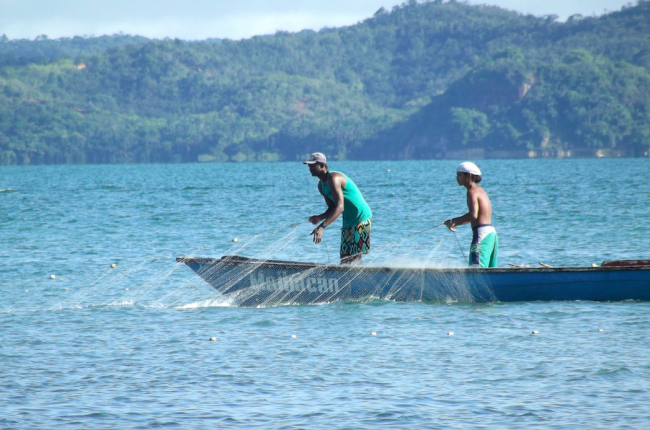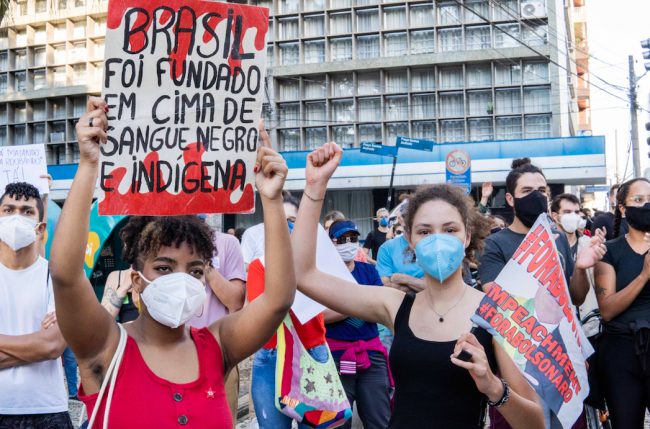
This piece appeared in the Summer 2022 issue of NACLA's quarterly print magazine, the NACLA Report. Subscribe in print today!
Leia este artigo em português. Translated to English by Emma Young.
The Baía de Todos os Santos—Bay of All Saints—is the largest bay in Brazil. Spanning 427 square miles, the bay forms part of the coastline of the state of Bahia’s capital city, Salvador, and of the surrounding Recôncavo lowland. Above all, the Bay of All Saints represents—and is at the foundation of—the way of life of the dozens of Black communities that live in the region.
Before colonization, the Tupinambá people, who inhabited the entire coast, called the bay Kirimurê. This reference remains essential for understanding the centuries of struggle and resistance that have taken place along the bay. Beginning with the establishment in the 16th century of the first sugarcane mills in the Recôncavo, the Bay of All Saints became a major locus of the tragedy of enslavement. But it also constitutes a major site of quilombola and fishing communities’ struggles for land, including confronting ongoing developments that threaten to destroy them.
Quilombo Conceição de Salinas is located within this geography. The fishing community’s name references its first ancestor, Filomena Conceição, a freedwoman who helped to erect the Church of Nossa Senhora da Conceição in the early 1700s. Today, the Quilombo Conceição is located in the municipality of Salinas da Margarida, across the bay from Salvador. For Black families in Bahia, the Recôncavo—and more specifically the Bay of All Saints—has always been a site of resistance and struggle. It is a territory that also bears Tupinambá ancestry and whose environmental configuration enabled the maintenance of ways of life that resist the predation of capitalist extractivism.
This is the history and legacy that Elionice Conceição Sacramento describes in this interview. A doctoral student in anthropology and author of the recently published book From the Black Diaspora to the Territory of Earth and Water: Women’s Ancestry and Leadership in the Fishing Community and Quilombo Conceição de Salinas, Bahia, Elionice identifies herself as “a fisherwoman, a quilombola, and a Black woman of the Filomena race,” representing the sixth generation of Filomena Conceição’s lineage in Quilombo Conceição. In this conversation, Elionice, 40, describes her living ancestry and the community’s future-oriented projects of collective living. For her, the future of the climate and the survival of humanity depend on Black territories. She invites us to learn about the different challenges, threats, and persecution faced in this crucial struggle and shows how various intersections play out in the lives of Black women. As she puts it, “I am not just me; I am a collective being.”
Jurema Machado: What makes you a leader of the quilombola and fishing community?
Elionice Conceição Sacramento: In 2005, we participated in the creation of the National Articulation of Fisherwomen (ANP) in Brasília, which took place together with one of the fishing conferences. And we—I say “we” because I am a collective subject—also participated in founding the Movement of Artisanal Fishermen and Fisherwomen (MPP), rethinking the movement’s principles and recognizing the importance of women and the women’s struggle in the Recôncavo and in Bahia. We are also fighting in partnership with other [Indigenous] peoples in general, because just as our antagonists organize, we emphasize the importance of being organized.
In this fight for the defense not only of our ways of life and traditions, but also of the territory that has been coveted by capital—which at times is confused with local political power—we have suffered threats. My family, for example, was almost dispossessed of our land, with our fishing shacks destroyed, fishing equipment burned, and crops uprooted. This happened three times between 2008 and 2013. We faced various threats—from landowners’ henchmen passing through with guns or via messages left on the beach in front of our farmland. When we hung a Marielle Franco street sign, it was ripped off. I have had to answer in court to lawsuits brought by the local administrator [mayor in the municipality of Salinas da Margarida], because every time we make a complaint, especially to the media, he calls the police, which in a way exists to intimidate and embarrass us. He has also used his personal social media accounts to attack my identity as a fisherwoman, calling it a cloak of misery. At the same time, he has defamed and slandered me, claiming that I owned a luxury home and lived a millionaire’s life all over Brazil.
My life in Brazil is one of struggle and advocacy. I participate in the national health council, representing fishermen and fisherwomen. I have been an advisor to an international network that brings together fishermen and fisherwomen from Latin America and Africa in the defense of mangroves. And the struggle greatly disturbs capital. Recently, a group including police officers, political figures linked to land speculators, a local administrator, and a senator from Bahia has persecuted several fishing and traditional communities. This militia—which calls itself a human rights group—denounced a false environmental crime supposedly committed by me, my family, and other families that make use of the traditional territory. The intent was to make us miss a session about a project to build resorts in the seafront area where we fish—and where capital is very interested in the project’s development.

We called the federal Public Prosecutor’s Office, the federal Public Defender’s Office (DPU), the Federal University of Recôncavo da Bahia (UFRB), in addition to other organizations, so that they could verify whether or not the community had committed a crime. And the DPU, the Bahia state public defender’s office, the Brazilian Institute of the Environment and Renewable Natural Resources (IBAMA), and other groups declared that there was no crime on our part—but that that the other side had committed a crime. So we have been living through this process.
I’ve been threatened—even publicly in the city council and by the local administrator. This has meant that we had to install security cameras in the fields and at home. We have to pay more attention to when we go out, the routes we take, who we communicate with, and whether or not we pass by certain people. But we also understand that being silent is not the answer. We need to continue resisting, organizing, and pursuing strategies of denouncing, because the situations of violence exceed the limits of our territory. In a way, we are more protected than if we were to remain silent, thinking that silence will protect us.
JM: For the Brazilian historian Beatriz Nascimento, quilombos were not only geographic strongholds of runaway Blacks, as the official historiography holds it. Quilombos are a form of social organization, a way of life, a space for cultural and racial defense. Nascimento’s conceptualization is very important for the affirmation and struggle of quilombola communities in contemporary times, but what does the quilombo represent today? What is the importance of quilombos for Black people, in their diverse situations and experiences?
ECS: This is what the community has expressed: the quilombo is a site of struggle and resistance, but also a place for welcoming and promoting life, and different forms of life. The [official] concept of quilombo, like the [colonial Portuguese] Overseas Council’s definition or other such understandings, always looked for a senzala (slave quarters), an aspect of this place of enslavement. Our quilombola struggle, our affirmation, stems from a site of freedom and the struggle for freedoms, without minimizing the historical and ongoing processes of colonization and enslavement in the country, implemented with brute force in the Recôncavo. We are part of it.
As a quilombola community, we have a centuries-old relationship with other territories. We’ve been constituted as a municipality [the municipality of Salinas da Margarida, where Quilombo Conceição de Salinas is located] for just over five decades, but this community, the quilombo, is 300 years old. The church, founded 319 years ago, was constructed either by enslaved labor or by people escaping enslavement. But the point is that this is a site of struggle and resistance, because for more than 300 years, we have been in the territory, confronting a development model they try to impose on us. We have preserved traditional ways of life. Not statically traditional—we don’t deny the interchanges we’ve had, and we don’t negate the power of colonialism. But we are saying that despite all this, in this territory of struggle, resistance, and freedom-seeking, we exist. Despite all this, fishing and agriculture remain viable and sustainable. We continue to worship, giving thanks to the waters, whether we call it Yemanjá, Oxum, or the holy spirit. We are saying that we continue to emanate from this territory, we continue to promote life under conditions other than the model imposed by capital.
From this relationship with nature, which we are part of and an extension of, we have sought spiritual, ancestral guidance to continue resisting. And this has worked, suggesting the need for us to continue with the principles of care, solidarity, and resistance, without losing sight of the struggle for freedom, which is constant. But to define quilombo for us is to say that it is a site of struggle and resistance, of not conforming to the system, to capital.
JM: We know that the idea of quilombo—in the sense of cultural defense and a way of life employed by Beatriz Nascimento—is imbricated in other identities held by Black people, such as identities related to productive activities. In the case of your quilombo, the relationship between quilombola and fishing identities is evident. Talk about this overlap and the concept of water territory.
ECS: There is a distorted idea about the construction of the quilombo: that it is land; an arable, agricultural territory. And when scholars come to the community and see that we don’t fit that profile—that we aren’t miserable, aren’t lacking food, our houses are not made of mud, or that our agricultural output is less than our fishing—they fail to realize that we are a quilombola and a fishing community. We are within the Bay of All Saints, at the mouth of the Paraguaçu River. In fact, real estate speculation has pushed us to this coastline. And we have lived through historical transformation processes, including the arrival of electricity and other elements, that have boosted our fishing production and guaranteed more favorable economic conditions, because economy is also a factor.
This is not just a territory of land. We’re talking about a territory of land and water. In the same way we have agricultural production, we have aquatic production. We have the fruits of the earth and the fruits of the waters. We can articulate two identities. And Babau [chief of the Tupinambá people of Serra do Padeiro, a village in the Tupinambá de Olivença Indigenous Territory], has told us that we can activate a third, because this territory is Tupinambá. So it’s about two identities, or three identities, that are not divergent—they are complementary. And ignorance or arrogance—an ignorant arrogance—is purposeful, because denying or disqualify one of these two identities reveals a lack of knowledge of the Recôncavo, of the Bay of All Saints, and of the colonial process itself.
Read the rest of this article, available open access for a limited time.
Jurema Machado de Andrade Souza is an anthropologist and professor at the Center for Arts, Humanities and Letters at the Federal University of Recôncavo da Bahia (CAHL/UFRB). Born in Salvador, she was raised in the Recôncavo, in the city of Cruz das Almas, Bahia.
Elionice Conceição Sacramento holds an undergraduate degree in philosophy and a master’s in sustainability with traditional peoples and communities from the University of Brasília. She is a fisherwoman and leader of the Quilombo Conceição de Salinas in Bahia, and she is currently pursuing a doctorate in anthropology.

